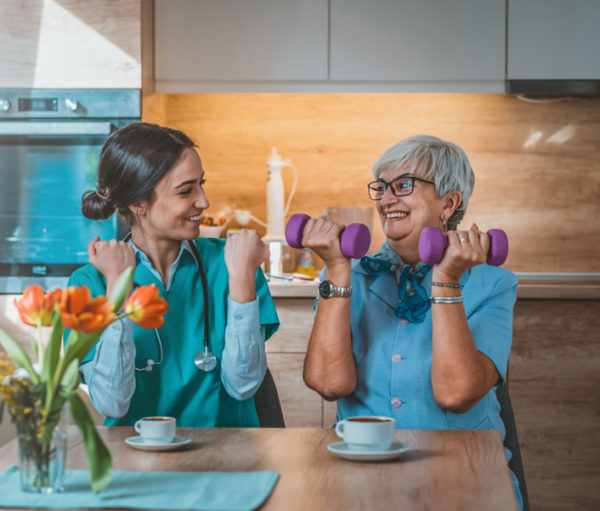May 8 – 14 Is Women’s Health Week

Each year, National Women’s Health Week begins on Mother’s Day. This is a great time to encourage the moms, spouses, grandmothers and other women in our lives to focus on their health.
Everyone faces health challenges as they grow older, but there are certain special considerations for women. Here are topics older women and their families can talk about—maybe even during Mother’s Day visits or calls!
Bone health. Women have smaller, thinner bones than men, on average, and hormone changes after menopause put women at higher risk of osteoporosis. Older women should have bone density tests as recommended by their health care provider, eat a healthy diet that’s rich in calcium and vitamin D, and take part in muscle strengthening exercise.
Heart health. Heart disease is the No. 1 cause of death among women. Women should follow their doctor’s recommendations for controlling their cholesterol levels and blood pressure. They should also be aware that the symptoms of heart attack can be different in women. Along with more familiar symptoms, such as chest pain and shortness of breath, women might experience back pain or nausea.
Stroke prevention. Certain factors, such as hormonal changes and hormone replacement therapy, can raise a women’s risk of stroke. And just as is the case with a heart attack, the symptoms of stroke might be different for women. They might have the hiccups or feel chest pain, along with the more typical numbness on one side of the body, confusion and difficulty speaking. Be aware of the signs and call 911 right away
Emotional health. Age-related health changes, the loss of a spouse and the stresses of the past two years have raised the rate of depression and anxiety among older women. Most doctors today include depression screening in an older women’s annual wellness exam. For Mother’s Day, remind everyone in the family to express their appreciation for all Mom does! And encourage her to report symptoms, and to take part in meaningful activities that provide mental stimulation and socialization.
Immunizations and screenings. Health screening recommendations change as a woman grows older. Women should talk to their doctor about cancer screenings, cholesterol and blood sugar tests. They also should stay up to date with the recommended vaccines. These include tetanus, seasonal flu and the recommended COVID vaccines. Older women should also be immunized against pneumonia and shingles.
Hearing and vision. Sensory loss is linked to poor physical, emotional and cognitive health. Studies show that women can feel very isolated when they have trouble seeing and hearing. Older women should have regular eye examinations. If hearing aids are recommended, use them and work with the audiologist to adjust as needed.
Nutrition. In their later years, older women may lose an unhealthy amount of weight—or, these days, gain too many pounds. Eating well can help. The doctor can recommend a diet that meets a woman’s nutritional needs, modifying the plan as necessary for health conditions such as congestive heart failure, diabetes, kidney disease or swallowing difficulties.
Physical activity. Many women reach the age of 65 having never really taken part in an exercise program. It’s never too late to improve health with an appropriate set of activities to benefit cardiovascular health, muscle strength and balance. If Mom lives in a senior living community, look into the fitness opportunities offered.
Fall protection. Diminishing bone strength puts older women at higher risk of dangerous fall injuries. Diet, exercise and a review of medications can lower the risk. And here’s a great Mother’s Day activity: Help Mom conduct an inspection of her home! Look for hazards and make modifications. If she lives in a senior living community, her home likely has safety features such as adequate lighting and grab bars, but it’s still good to regularly clear clutter and tripping hazards.
2022 is a great year to offer not only flowers and cards for Mother’s Day, but also to offer support to help Mom take care of her health. That’s a great gift to honor all she’s done for us!
Source: IlluminAge
The information in this article is not intended to replace the advice of an older woman’s health care provider. Encourage your loved one to talk to the doctor about healthy lifestyle choices and managing health conditions.


